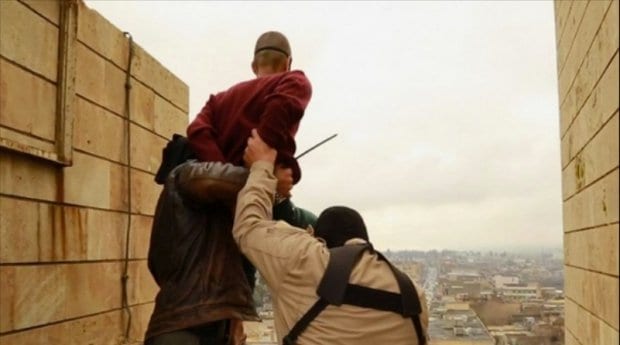Deep in the concrete jungle of Cairo, he hides. His face carries the pain of the days he spent in a gloomy, dark and humid prison cell with many men like him.
The men were arrested last December in a bathhouse raid in Cairo, paraded in front of cameras and dragged naked to waiting police cars. But the real torture did not start then.
A judge acquitted the men of “debauchery” but the ruling hardly set them free. Not in that society.
I imagine the man walking the streets of Cairo, free from the persecution of the law but fearing the eyes of others.
I imagine his face hiding deep within his own soul, searching for answers. Is he gay? This is not the point: he was released from prison because he was found innocent of “debauchery” but he was certainly not freed to be gay.
Now, when he tries to leave the house, his brother stops him, insists on accompanying him everywhere. His father hasn’t spoken to him in weeks. He hears his mother crying deep in her bedroom late at night, whispering her pleas to a god that stopped listening a long time ago.
Every glance feels like a tiny drop of water aimed at his forehead. The sea of eyes is invasive, frozen and sharp: it spears his skin like tiny knives aiming at his soul.
His room, where he spends most of his time, feels smaller than that crowded prison cell. He pulls the matches from his pocket and sets himself on fire.
Deep in an Egyptian hospital, the nameless man now sleeps, his hands and legs covered in third-degree burns after his attempt at self-immolation in February. Slowly his story is forgotten, buried deeply under the piles of heartbreaking stories streaming from the Middle East.
His story fades away in a region where governments, societies, armed oppositions, rebels and terrorist groups have been fighting endlessly since early 2011.
Was this nameless man thinking of Mohammed Bouazizi when he struck the match? Bouazizi set himself on fire too, more than four years ago, to protest his own pain on the streets of Tunisia.
Bouazizi was a street vendor who lived a simple life in Tunisia but felt a similar despair. His pride couldn’t cope with the helplessness he felt when government officials confiscated his wares and harassed and humiliated him in December 2010.
Bouazizi’s act of self-immolation was the first domino to fall in what became known to the world as the Arab Spring. As they fell, the dominoes brought successful revolutions in some countries, smashed warlords in others, provoked civil and sectarian tensions in others and, finally, brought together the trash of humanity to form an octopus-like monster called the Islamic State in occupied lands.
Bouazizi is considered a martyr. The man accused of homosexuality in Egypt is considered tainted.
The casualties of the aftermath of the Arab Spring accumulate daily. Among them, gay people might be the most vulnerable of them all.
Gay victims are voiceless. They die knowing that no one cares. Their governments criminalize them, their society doesn’t care for them, their religion rejects them and terrorists force them to jump off buildings.
In Syria, accusations of homosexuality have been used as a tactic by the government to tarnish the reputation of popular opposition figures since the start of the Syrian crisis in 2011.
In areas controlled by the terrorist group known as the Islamic State across Syria and Iraq, gay men are thrown off buildings as punishment. The local communities gather to watch the executions. When throwing one man from the seventh floor failed to end his life, his community stoned him to death.
In Egypt, following a year of constant and increasing arrests and entrapment of gay men, the Egyptian government reintroduced the anal test. A torturous and invasive medical practice, it’s supposed to determinate the sexual orientation of a person based on the shape, flexibility and size of his anus. As if.
Other than the local activists, who are overwhelmed by the outrageous anti-gay developments in the region, no one seems to pay attention to the struggles facing gay men. Their feeling of abandonment is justified. They are everybody’s favourite target in a region torn by conflict: a perfect scapegoat in a perfect storm.


 Why you can trust Xtra
Why you can trust Xtra


